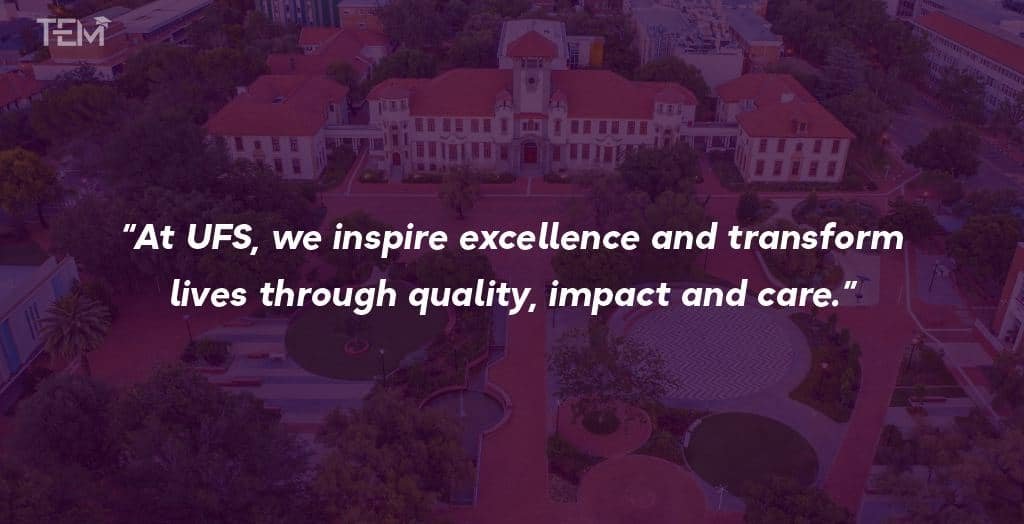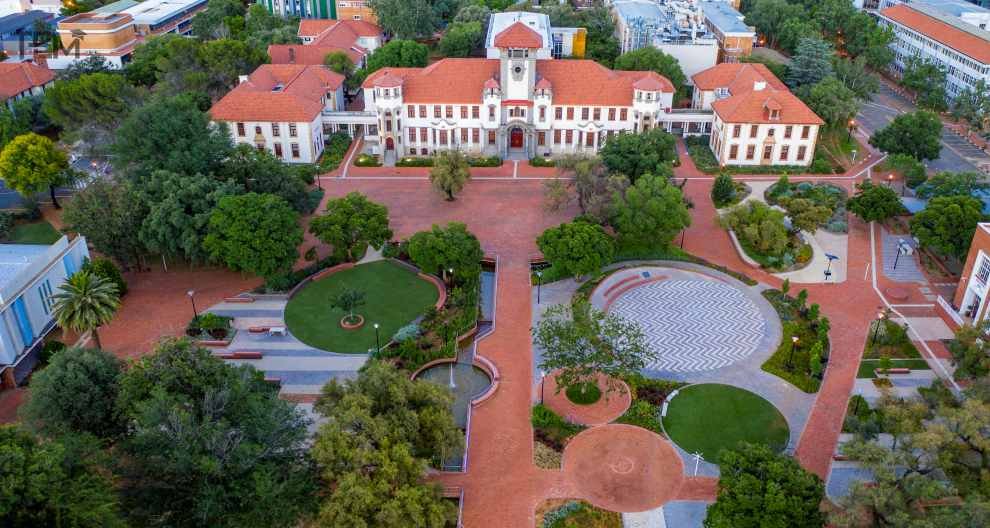Over the years, there has been a progressive change away from focusing primarily on academic and clinical abilities and toward a much more holistic strategy that equips health sciences graduates with competencies and skills that qualify them to provide the greatest possible human-centered care.
The goal of healthcare education in the twenty-first century is to prepare competent professionals as communicators, collaborators, academics, health advocates, leaders, and managers. At the University of the Free State (UFS), innovative programs focus on interprofessional, community-based education and technology-enhanced learning, teaching, and assessment that is relevant and authentic.
Starting from the Scratch
The UFS is one of South Africa’s oldest universities. Founded in 1904 with six students in the Humanities, it has developed into a well-respected, highly internationalized, and regionally active school, with around 42,000 students scattered across three varied campuses in seven academic faculties.
The vision of the UFS is to be a research-led, student-centered, and regionally engaged university that contributes to the development and social justice through the production of globally competitive graduates and knowledge. The education at the UFS relies on three pillars: Teaching and learning, Research, and Engaged Scholarship.
Firstly, UFS has an innovative perspective and a dedication to excellence in terms of teaching and learning. This encourages ongoing examination, renewal, and updating of the curriculum, as well as incorporating innovative teaching approaches that embrace technology in all of its forms. Secondly, the research strategy of UFS responds to the institutional goal of increasing contribution to local, regional, and global knowledge, and aims to address fundamental and strategically important questions. Lastly, the Engaged Scholarship model is about connecting the best of staff and student research, teaching, and learning abilities to particular societal learning and development requirements.
Evolution of Courses and Programs
The UFS provides a wide range of high-quality and globally recognized degrees, diplomas, and certificate programs in the following faculties: Economic and Management Sciences, Education, Health Sciences, the Humanities, Law, Natural and Agricultural Sciences, and Theology and Religion. It also houses a Business School and various Open and Distance Learning offerings and Short Learning Programmes. Over time, these programs have grown by adding indigenous knowledge systems and new information into the curriculum, as well as continually adapting to innovation and universal best practices in different study sectors.
Campus Tour and Student Life
The UFS has three unique campuses, each with its own distinctive character.
- The Bloemfontein Campus, in Bloemfontein – the capital of the Free State province – is the oldest and biggest of the three. It houses many student residences, lecture and study spaces, and sports facilities. Historic buildings rub shoulders with modern architecture, while eco-friendly landscaping minimizes the institution’s carbon footprint, and communal spaces celebrate diversity and promote a community environment.
- The Qwaqwa Campus in the picturesque rural Eastern Free State has a strong focus on socio-economic development, informed by a rural context. It is home to the internationally acclaimed Afromontane Research Unit (ARU), which is doing ground-breaking work to empower vulnerable mountain communities with uplifting environmental, social, and economic knowledge.
- The South Campus, also in Bloemfontein, provides alternative access to higher education for promising students who did not get the required marks in their final school examinations. It is also home to various open and distance learning initiatives, and the center of a variety of very successful collaborative projects in schools.
The UFS maintains a vibrant student life, with several efforts to support students’ academic, psychological, and social well-being. Peer mentoring programs help students move smoothly from high school to university life. There are also specific projects to help the growing number of international students feel at home, as well as an ‘internationalization-at-home’ strategy that exposes all students to an international experience – through engagement with international students, cultural celebrations, and other curricular and co-curricular activities.
Extra-curricular Activities and Resources
The UFS boasts a remarkable array of sports facilities and provides high-level coaching and instruction in 22 sports to its students. Students can also participate in a variety of arts and culture-related activities, including high-quality university choirs, theatrical sing-off contests, theatre performances, and multicultural festivals, in numerous well-equipped auditoriums and theatres.
Current Programmes on Offer
There are five different schools within the Faculty of Health Sciences, enabling the UFS to offer diverse and comprehensive healthcare training:
- The School of Clinical Medicine is nationally and internationally renowned for its training curriculum and the excellence of the medical and medical physics graduates produced, with a training platform that includes various hospitals and clinics throughout the Free State. Departments within the school represent the full array of medical disciplines, such as cardiology, dermatology, neurology, Family Medicine, psychiatry, and pediatrics.
- The School of Biomedical Sciences hosts an advanced Clinical Simulation and Skills Unit that compares with the best in the world, as well as offers state-of-the-art dissection facilities.
- The School of Health and Rehabilitation Sciences offers training and research opportunities in Exercise and Sport Sciences, Nutrition and Dietetics, Occupational Therapy, Optometry, and Physiotherapy.
- The School of Pathology comprises Anatomical Pathology, Chemical Pathology, Haematology and Cell Biology, Human Genetics, Medical Microbiology, and Virology.
- The School of Nursing remains at the forefront of nursing education with its innovative simulation, teaching, and learning facilities.
Individual Attention and Support
The Centre for Teaching and Learning’s academic achievement efforts have garnered the UFS international acclaim. Language and literacy development, writing skills aid, and well-supported tutorial programs are examples of these. The UFS also leads South African institutions in academic counseling, ensuring that students’ educational routes are linked with their employment goals.
The Department of Student Counselling and Development provides psychological support through individual sessions and workshops that address a variety of issues that students often deal with, such as time management, self-acceptance, and relationships. South Africa has 11 official languages, and the UFS Academy for Multilingualism is performing ground-breaking work to build innovative multilingual pedagogic practices across the institution to overcome language hurdles.
Take on Modern Employment
Healthcare graduates have a wide range of job options, including general practitioners or medical specialists in the public or private sector, as well as nursing professionals, physiotherapists, occupational therapists, and biokineticists (exercise experts) in the allied health professions.
The UFS places a major emphasis on cultivating flexibility among its graduates in order to meet the ever-changing need of employers to remain relevant. UFS graduates’ qualities have evolved away from a strict concentration on academics, adding components of local and worldwide workplace requirements. With academic competence remaining at the center of its vision, aspects such as critical thinking, problem-solving, oral and written communication, ethical reasoning, civic engagement, and entrepreneurship currently make up the rest of its envisaged graduate attributes.
The UFS also places high significance on cooperation and has several highly regarded industry partners that provide help as bursaries and internships. Faculty Advisory Boards Consisting of people from business and government guarantee that courses remain current.
Response to Pandemic
The COVID-19 pandemic has underlined the necessity of teaching a new generation of healthcare professionals capable of adapting to changing societal and global concerns using evidence-based research and resilience. The educational environment has transformed into a blended learning approach that embraces technology, while simultaneously acknowledging the diversity of human experience and student support needs.
In response to the lockdown limitations, the UFS implemented emergency online tuition at the start of 2020. Innovative programs, such as its ‘No Student Left Behind’ campaign, have enabled the university to assess student participation in online learning and implement interventions as needed, by using advanced data analytics.
Quote

ALSO READ: “Nursing Insights, 2023”


